Civil Liberties, Criminalizing Dissent, Crony Capitalism, Death Penalty, Human Rights, Military Tribunal, Political Prisoner, Prison Industry, Targeting Muslims, Torture
Podcast: Play in new window | Download
Updates:
—-

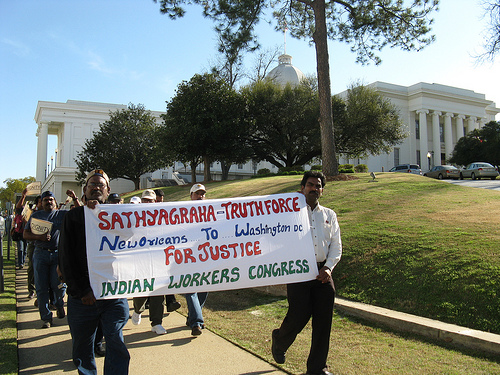
Largest Human Trafficking Case In The US? Workers Lured To U.S. After Hurricane Katrina And Subjected To Abusive Conditions Seek Class Certification
In what may be the largest human trafficking case in US history, Indian guest workers are suing Signal International for human trafficking ad racketeering. Several law firms filed the lawsuit on behalf of seven plaintiffs representing 500 formers guest workers lured into the US after Hurricane Katrina. The guest workers were subjected to racial discrimination, forced labor and other abuse.
Signal is a multi million dollar marine fabrication company with shipyards in Mississippi, Texas and Alabama. They repair and build oil rigs and ships and subcontract with the Dept of Defense and multinational companies. After Hurricane Katrina, Signal’s workforce scattered and they used the government’s guest worker program to import employees as welders and pipe fitters. Between 2004 and 2006 hundreds of Indian men were paid up to 20 thousand dollars each for travel, visa and other fees after being told it would lead to good jobs and permanent US residency.
When the men arrived at Signal they discovered they would not receive green cards, but instead were given 10-month guest worker visas. Signal forced the men to pay $1,050 a month to live in overcrowded, unsanitary and racially segregated labor camps with no visitors allowed. To talk more about this case, we’re joined by Chandra Bhatnagar is a Staff Attorney with the Human Rights Program and Sabulal Vijayan, a former guest worker involved in the lawsuit.
Chandra Bhatnagar:
- Signal used the opportunity of the storm to seek out new labor pools. Signal in partnership with an American labor broker, an American Immigration lawyer and an Indian recruiter, conspired to bring in a group of 500 men from India as H2B guest workers.
- The workers were promised green cards, permanent residency, and the opportunity for long term jobs.
- Sabulal Vijayan: I was working in the middle east, the United Arab Emirates, I saw the ad by Signal that said we would get permanent residency in America. I paid about 18 thousand dollars, I cut my wrists in fear, I tried to kill myself because I spent a bunch of dollars. I was in the hospital for 3 days. I couldn’t go back to my family in India with bare hands, because I spent all the money on this job. Not only me but 500 workers, sold all their land and houses for this job.
- The EEOC, brought a separate lawsuit against Signal, alleging racial and national origin discrimination and hostile work environment.
- Because Sabulal was one of the workers seeking his rights under the law, he was particularly targeted by Signal and rounded up in an early morning raid. The camp was built on a lead contaminated waste site.
- It’s not OSCHA compliant to have 24 guys jammed together in a temporary trailer.
- These are in the United States and in debt. The average income in India is 3000 dollars a year for a ship worker. To pay 20 thousand dollars, you have to sell your property, borrow money from loan sharks. You have to mortgage your whole life for the opportunity to come here. Signal also said if you file a lawsuit, we’ll send all of you back.
- Signal is a marine fabrication company, a multi-million dollar company. They repair and build oil rigs and ships. They have yards in Mississippi, Alabama and Texas. They provide services to the Department of Defense and major corporations.
- It was a conspiracy between the Immigration lawyer, the Indian recruiter, the labor broker and Signal.
- Signal got this vulnerable pool of workers who they could throw away whenever they wanted to.
- You don’t have freedom of contract as a guest worker, you’re the disposable property of the employer.
Guest – Chandra Bhatnagar, ACLU Staff Attorney with the Human Rights Program. He leads the domestic and international advocacy around racial profiling, affirmative action, and juvenile justice issues, and is engaged in federal court litigation and litigation in international tribunals involving the rights of low-wage immigrant workers, undocumented workers, and guest-workers.
Guest – Sabulal Vijayan, guest worker from India, who is involved in the case. Sabulal, a pipefitter, paid nearly 20 thousand dollars to work in the United States as a guest worker. He worked with others in slave labor-like conditions for Signal International.
———–


Professor John Ehrenberg: Class Warfare Update and Analysis
Returning guest, professor and author John Ehrenberg joins us in the discussion of where the last 3 years the Obama Administration has led the country. The United States is pouring trillions into multiple war theaters, unemployment continues to rise, CEOs of banks and corporations have been rewarded with taxpayer bonuses and bailouts, and a massive unequal distribution of wealth has polarize the country. Meanwhile, the very rights that protect organized labor and the benefits of workers are attacked and disassembled during one of the worst economic downturns to hit the United States. Corporations and the far right wing of the Republican Party are behind some of the union busting yet even President Obama turned his back on supporting union labor demonstrations. Most recent show with John Ehrenberg
Professor John Ehrenberg:
- The elephant in the room that nobody talks about is the role of the state and the role of the government.
- Winner-Take-All Politics: How Washington Made the Rich Richer–and Turned Its Back on the Middle Class
- What you had since the 1980s is a policy pushed by the Republicans and acquiesced by the Democrats of undoing the Great Society. We’ve seen this in the union busting and refusing to tax the rich. It’s been happening because the Republican party is getting more radical.
- The villan in the room is governmental and fiscal policy.
- The top 1 percent of the population received more than a third of all the wealth created in the country from 1979 to the beginning of the recession. The top 1/10 of one percent, that’s one out of every thousand households, received over 20 percent of all the after tax gains between 1979 and 2005.
- It was a conscious policy. It began in the late 70s by business. If you look at the neo-conservatives of that period, their target is the Great Society.
- Basically in the late 60s and the early 70s, the traditional stimulus programs of the Democrats failed.
- Along comes Reagan and he takes on a radical restructuring of the economy.
- Which began this process of shoveling huge amounts of wealth to the rich, hoping that it would trickle down and you’d have sustained growth.
- Consider that Obama is going to raise a billion dollars for his reelection campaign. Where is he going to get it from?
- Look, anybody at this stage of the game who continues to trust the Democratic party to lead the country out of this mess, is a fool.
- The Democratic Party by itself is incapable of democratic initiative and progressive change unless forced to respond from pressure from outside.
- When do they have enough? The answer in 1100 pages of Capital: A Critique of Political Economy is it’s never enough. That the logic of capital is to reduce everybody to starvation and take everything they have.
- This is the motor of the system, this has nothing to do with the Koch Brothers.
- Hopefully people are tired of being pushed around. American exceptionalism, meant that Americans were more tolerant of inequality, than were people from a stronger labor tradition.
- That American’s didn’t care so much if other people got rich as long as they got rich too.
- If you have a situation where Americans are misinformed about the distribution of wealth and are open to appeals to redistribute wealth in the name of fairness and equity, then this is the time for a redistributus Democratic party to step forward.
- If the Democratic Party is even a modicum of sanity in America, it’s because its going to have be pushed again. Pushed and pushed and pushed from outside.
- 55 percent of Republicans want higher taxes on the rich.
- There are local manifestations of outrage and rebellion, in Wisconsin, Indiana, Ft Lauderdale, around different aspects of the mal-distribution of wealth. – but nothing has been coordinated on the national level.
- There are as yet, no forces talking about the system as a whole, as a state.
- There are a lot of indications across the board that people have had enough.
- Go out there and join something and get involved.
- UNICEF publication. The Children Left Behind. Indices: Health, Education, Material Well Being. The United States is last of the 24 countries.
- If you look at the fall of any of the world’s empires, it was a combination of the over reach and the refusal of the rich to pay their share of taxes.
Guest – John Ehrenberg, author of Servants of Wealth, The Rights Assault on Economic Justice, he’s also professor of political science at Long Island University.
————————————————————————-
Civil Liberties, Human Rights, Military Tribunal, Targeting Muslims, Torture, Truth to Power, War Resister
Podcast: Play in new window | Download
Updates:
—
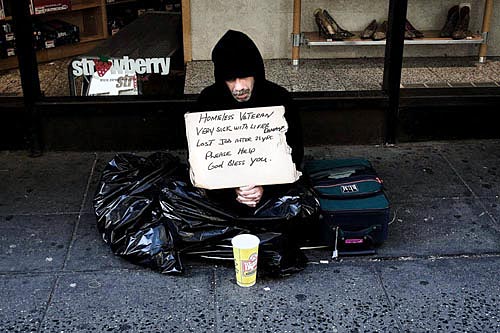
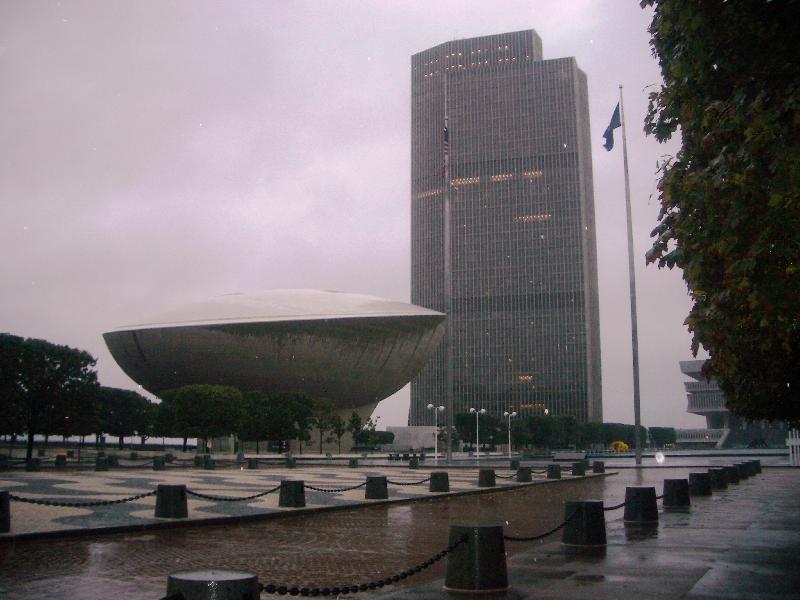
New York City Rent Laws Set To Expire June 15, 2011
Rent and tenant protections for half of all New York City renter households plus thousands more are set to expire on June 15, 2011. These laws have been the foundation for affordable rental housing for middle-class and low-income New Yorkers. If the rent laws are not renewed, it could lead to unprecedented evictions and homelessness could spiral even further out of control. It’s explained in the above linked article by Patrick Markee Senior Policy Analyst at the Coalition for the Homeless, titled Tell Albany: Renew and Strengthen Rent Laws.
Patrick Markee:
- Two out of three households in New York City are renters. Half of all New York City renters are protected by rent and eviction protection laws that go back 60 years to the New Deal era.
- Right now the stakes are as high as they could be and the political environment is as bad as it can be.
- We have a governor who’s been strongly supported financially by the real estate industry.
- Fortunately we have a state assembly there that is strongly pro-tenant. Half of all New Yorkers are rent stabilized apartments which means rent increases are regulated each year.
- The fundamental protection for tenants is they can’t be evicted except for just cause.
- Those protections have been weakened by vacancy destabilization. Because of that we’ve lost 300 thousand rent stabilized apartments over the last decade and a half.
- Right now we have 39 thousand people including 16 thousand children bedding down in the municipal shelter system.
- Just this past month we’ve reached the highest census in the shelter system since the city has been keeping records. Forty percent more people are cycling through the shelter system than when (mayor) Bloomberg took office in 2002
- We’ve had a perfect storm, loss of affordable rental housing across the country, due to Bush Administration cut backs, at the same time, we get the economic recession, and unemployment, add on top of that the foreclosure crisis. 3 out of 4 homeless people are families with kids.
- New Yorkers have a state constitutional right to shelter.
- Contact Governor Cuomo, contact your state legislator.
Guest – Patrick Markee, Senior Policy Analyst at the Coalition for the Homeless and writer of many of the fine articles on the Coalition For the Homeless website.
———-

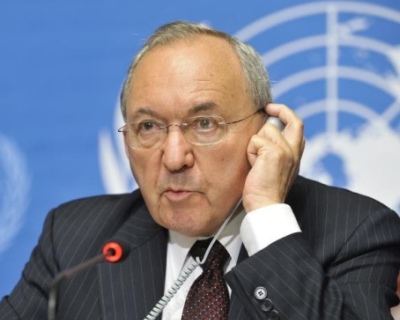
The Goldstone Report Now Belongs to the World
Lead author of The Goldstone Report, detailing the 2008-2009 Israeli assault on Gaza has changed his position on the issue of targeting civilians. In an editorial by the Washington Post, Judge Richard Goldstone said, “Civilians were not intentionally targeted [by Israel] as a matter of policy.” And then Israel has called on the United Nations to retract the report on Operation Cast Lead, the war that led to the death of about 1,400 Palestinians, including hundreds of civilians, and 13 Israelis. Earlier this year, Law and Disorder talked with co-editors of the book titled, The Goldstone Report: The Legacy of the Landmark Investigation of the Gaza Conflict.
Phil Weiss:
- Our book came out 2 years after the Gaza conflict and people said why now, who cares about this? Now we see why.
- This statement by him (Judge Goldstone) was immediately seized upon as a disavowal of the report by many supporters of Israel.
- Prime Minister Netanyahu of Israel immediately called on the UN to withdraw the report.
- The US State Department came out and said this just shows there were no war crimes committed during the Gaza conflict.
- What remains in the Goldstone Report? Geneva Convention: Principle of Distinction and Disproportional Attack
- Other important crimes noted in the report: using white phosphorus, targeting infrastructure, destroying a water treatment facility, destroying a flour mill, destroying food production.
- Even you have a military target, you have to attack that proportionately. One Israeli commander said, we don’t want a hair of our soldiers to fall here.
- This (Gaza) is the size of the Bronx and Queens put together
- The central case that Goldstone based his reconsideration was one of the most horrific cases during the war.
- That took place on January 4, 2009 in a village outside of Gaza City.
- The Israelis were trying to secure parts of Gaza City from the east. They seized this area as a strategic base. They had herded 120 members of an extended family into one house. They had forced them to stay there for a couple of days.
- In the midst of this operation, on that morning, helicopter gun ships came and shelled that house, killing 29 people. In the report Goldstone offered this as another case of targeting civilians.
- I would say “because” this report came out, Israel has produced evidence that the helicopter gunship guys misread drone images. Showing men carrying firewood back to this house as being men carrying rocket launchers.
- Goldstone is saying, I accept the Israeli version here, I think that it was out of negligence or a mistake.
- This reconsideration has got more attention than the whole report.
- This fall the UN General Assembly could vote to establish to make Palestine, a Palestinian state.
Guest – Philip Weiss, founder of the blog Mondoweiss, longtime journalist and regular contributor to the Nation and a fellow at the Nation Institute Philip is the author of two books a political novel, Cock-A-Doodle-Doo, and American Taboo, an investigative account of a 1976 murder in the Peace Corps in the Kingdom of Tonga. Weiss is one of the editors of The Goldstone Report: The Legacy of the Landmark Investigation of the Gaza Conflict.
——————————–
Civil Liberties, Criminalizing Dissent, Extraordinary Rendition, FBI Intrusion, Habeas Corpus, Human Rights, Military Tribunal, Supreme Court, Surveillance, Targeting Muslims, Torture
Podcast: Play in new window | Download
Updates:
- Anwar Al-Aulaqi Case – Drones Targeting US Citizens – Obama Wants To Dismiss CCR/ACLU Case
- CCR Guantanamo So Called Suicide Cases
- Supreme Court Will Not Review Case On Feds Wiretapping Guantanamo Lawyers
- Bombing of the USS Cole – Could Prosecutors Use The Fruit From the Poisonous Tree?
—-
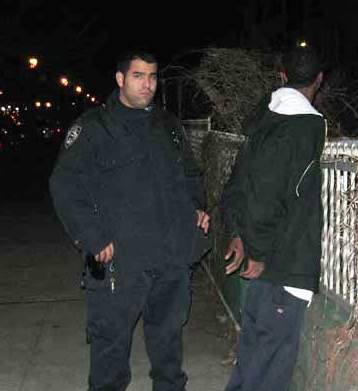
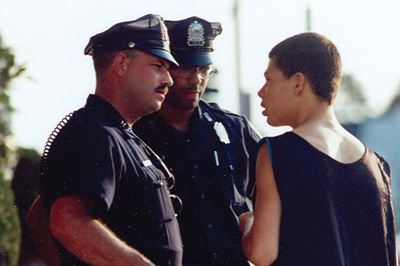
NYC NLG Street Law and Racial Profiling Program
Today we’re joined by Paula Segal and Gabriela Lopez with the New York City Lawyers Guild Street Law Clinic Program. The project sends groups of attorneys to conduct “Street Law” workshops with a range of students in high school. We’re also joined by students from the Aarturo A. Schomburg Satellite Academy High School who were part of the street law classes.
Street Law Students:
- In my neighborhood it’s really common for the Police to bother you for no reason. I don’t think they had the right to go into my pockets unless they had reasonable suspicion. This happens at least 3 times a week.
- One time they took me into the precinct, took my picture, ran my fingerprints.
- I was getting off the train and these two big police men were getting off the train and they stopped me. They said we have her on the walkie-talkie. This women said take off your sneakers. She kept asking, where is it? Where is it? That’s when she started to get physical and she lifted up my shirt. “If you don’t f-in’ tell me where it’s at, I’m going to strip search you. It happened on Elder Avenue, next to the 6 train.
- They say no, we’re not going to touch you, then he throws me on the car.
- You guys are unfolding my socks right now, and I don’t like this. There’s a certain way that I fold my socks.
- After they find nothing, they say you should change your attitude. I said, you should change your attitude.
- A lot of cops judge character, when I see cops, you have to give them an expression. Hey look I’m out here, I’m not tryin to get in that car.
- I’m thinking about the cops catching the real villans. If you’re really guilty you’re going to get hassled, if you’re not guilty,then you can be free. The advice I get from the street law project is not consenting to the search.
- From my knowledge, the cops need a certain amount of arrests at the end of the month, so they’ll pick on anybody. They curse a lot. Undercover cops, they’ll probably have on a hoodie, try to fit in with everybody else, it just don’t work.
- Law Student Paula Segal: We focus on giving people tools to walk away, to avoid arrest.
- Law Student, Street Law Coordinator Gabriella Lopez: Last year we went to more than sixty different sites. Sixty to Seventy different trainings that occured last year.
- Email the Street Law Team – streetlawteam@gmail.com
Guests – Paula Segal and Gabriela Lopez with the New York City Lawyers Guild Street Law Clinic Program. Aarturo A. Schomburg Satellite Academy High School Students: Charisma Whaley / Joseph Campbell / Kiara Avila / Stephanie Colon / Jonathan Jeffries.
—-
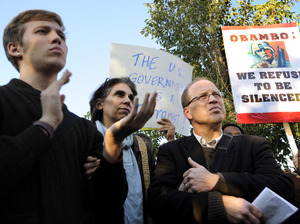

Grand Juries Historically and the Minneapolis / Chicago FBI Raids
A total of 12 people were served with subpoenas during last months FBI raids in Minneapolis and Chicago. The FBI targeted anti-war peace activists and key organizers of demonstrations and marches who have been asked to appear before a grand jury. What is a grand jury? Historically, a grand jury was supposed to be citizens coming together to determine if charges should be filed criminally against someone. Today, it’s very different. It’s mostly a rubber stamp for what the prosecutors want. If you refuse to testify at a grand jury, you can be taken to a judge to answer questions. If you refuse to answer those questions you could be put in jail.
Margaret Ratner-Kunstler:
- If you were subpoenaed before a grand jury in 1968 and you asserted your grand jury right, then that really was the end of your participation in the grand jury.
- You asserted immunity and if you we’re given immunity, you couldn’t be indicted.
- Immunity: Nothing you say could be used against you, but anything you testified about could not be the subject of a criminal indictment against you. Your words could not be held against you, or the fruits of those words. But it’s so easy to get around that, by a prosecutor saying, this didn’t come from this.
- If you then refused to testify given this minor immunity, you could be subject to imprisonment.
- If you refuse to testify you’re brought back before the judge and the judge then holds you in “civil contempt.”
- The grand jury is usually about 18 months. The grand jury in Chicago is a special grand jury which means it’s twice as long.
- That’s important because if you’re held in civil contempt, the keys to the jail are in your pocket. You’re in jail for as long as you refuse to testify.
- If you say something you could wave your fifth amendment right by already saying something.
- The recent FBI raids represents the tremendous see-change we have in terms of the ability for people to actively oppose this government’s policy.
- In 1983, there were many groups in this country who were joining forces with progressive groups in Central America. You had the Committee in Solidarity With the People Of El Salvador.
- Each of the 11 individual persons subpeoned wrote letters to the Attorney General saying that they would assert their fifth amendment right and that they would not testify.
- If they can’t get you on a federal charge it’s often that they’re looking for a mistake you made in conversation, even an informal conversation with a federal official.
Guest – Magaret Ratner-Kunstler, an attorney in private practice. As education director at the Center for Constitutional Rights, she originated the Movement Support Network and authored “If an Agent Knocks.” Kunstler is the President of the William Moses Kunstler Fund for Racial Justice, a foundation established in 1995 in the memory of her late husband to combat racism in the criminal justice system.
———————
Civil Liberties, Criminalizing Dissent, Habeas Corpus, Human Rights, Military Tribunal, Political Prisoner, Prison Industry, Supreme Court, Targeting Muslims, Torture, Truth to Power
Podcast: Play in new window | Download
Updates:
—
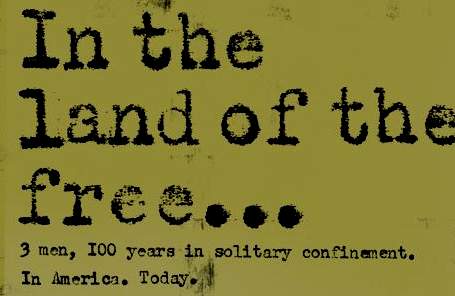
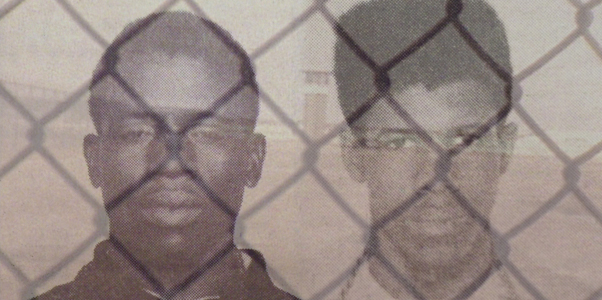
In the Land of the Free, a film by Vadim Jean
Director Vadim George joins us to discuss his recent documentary film “In the Land of the Free.” As many listeners may know, the Angola 3 are Robert King, Albert Woodfox and Herman Wallace. Each had arrived to the Louisiana State Penitentiary in the late 1960s. While in prison, and in contact with Black Panthers, the men helped build a prison chapter of the Black Panthers. They organized inmates to end systematic rape and violence and worked as jailhouse lawyers. The men have spent a combined century in solitary confinement in the Angola prison. Vadim’s powerful documentary explores the issues of accountability and examines the biases against the sentencing of African Americans compared to Whites and Latinos. The film is narrated by Samuel L. Jackson, and it’s noted toward the end, that there is a pending civil suit ‘Wilkerson, Wallace and Woodfox’ vs the State of Louisiana, ruled by the US Supreme Court and to go to trial based that their 30+ years in solitary confinement is “inhumane and unconstitutional”. This case could stop long-term solitary confinement in US prisons.
Vadim Jean:
- I was friends with Anita Roddick, she knew Robert King, and when she passed away in 2007, Robert King was one of the speakers at her memorial. They wouldn’t let me film in the prison.
- The Angola 3 came together in the New Orleans parrish prison in the 1970s.
- The criminals were put in with the Black Panthers and the Black Panthers educated the criminals.
- In the 1970s Angola was the bloodiest prison in America.
- Robert King was told why he was kept in solitary confinement after 25 years in CCR (solitary confinement)
- Because he was being investigated for the murder of Brent Miller, which happened when he wasn’t even in the prison. They’re incredible human beings. They’re strong men. They’re self educated, in prison.
- I think they have their side, the fact that they know they’re innocent, and that makes you strong, that’s made them incredibly strong. They refused to be beaten.
- Robert is free. His conviction was overturned in 2001. People have reacted strongly to the film.
- I’ve tended to make drama comedies. I made a completely mad film called Jiminy Glick in Lalawood with Martin Short.
- I made this film for Anita. (Anita Roddick) The Roddick Foundation.
Guest – Vadim Jean, began his career directing commercials for products such as Blockbuster Video, Woolworths, The Observer and Mercury 121 Mobile Phones. He then moved on to music videos for Elton John and Oasis before co-directing his first feature film, Leon the Pig Farmer (1992). For his work he won an Evening Standard British Film Award for Most Promising Newcomer, a Chaplin Award for Best First Feature at the Edinburgh International Film Festival.
——–

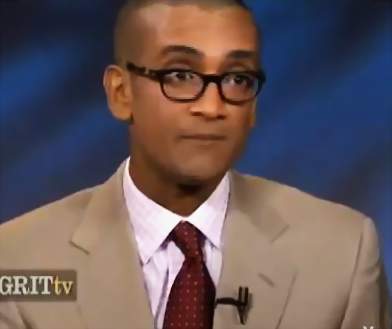
Law and Disorder Barack Obama Series – CCR Staff Attorney Shane Kadidal
We’re joined by Center for Constitutional Rights staff attorney Shane Kadidal to give us an overview on several critical topics we’ve been following over the years here on Law and Disorder. We look at what is happening in Guantanamo right now, the Obama policy of preventive detentions and the state of Habeas Corpus in the United States. In January of 2009 Barack Obama issued orders to close Guantanamo Bay prison. There was talk of transferring prisoners to a supermax prison in the United States. Military tribunals move forward for Guantanamo prisoners.
Shane Kadidal:
- What we won is the right to get into court and challenge the legality of your detention. CCR won that in 2008
- Obama gets into office and says he’s going to close Guantanamo Bay Prison in a year.
- Obama to set up expert agency to decide what to do with people in Guantanamo prison
- About 50 cases have gone forward and we (CCR) won 72 percent of the cases
- About 180 left in Guantanamo. Obama has improved physical conditions for detainees in Guantanamo, but they’re still stuck there. Nothing much has changed, we see stasis, there isn’t much political movement.
- About a month into the administration, the Obama Department of Justice says our position is the same as the Bush administrations on Bagram AFB prison
- We’re taking the same legal position about executive power as the previous administration – state’s secrets about rendition
- Six hundred people in Bagram right now. Bagram is an active war zone, can’t have courts interferring
- About 30 of the remaining 180 in Guantanamo will be charged. Most of the people brought there were innocent. The victim of profiling policies.
- General Stone says 400 of the 600 hundred in Bagram Prison have done nothing and should be released immediately. Task Force report on Guantanamo prisoners. 10 percent leaders of Al-Qaeda, 20 percent had a logistics role, others are low level soldiers. This is false.
- There are innocent people in Guantanamo, who have been there for 8 years.
- We still have a military commissions, an indefinite detention system. Lieberman proposing to strip citizenship from terrorism suspects so they can be interrogated without Miranda warnings.
- Moving Guantanamo Prison to Thomson Prison in Illinois.
- Obama as committed to removing checks on executive power
Guest – Shane Kadidal senior managing attorney of the Guantánamo Global Justice Initiative at the Center for Constitutional Rights in New York City. He is a graduate of the Yale Law School and a former law clerk to Judge Kermit Lipez of the United States Court of Appeals for the First Circuit.
Past shows with Shane Kadidal
Civil Liberties, Criminalizing Dissent, Habeas Corpus, Human Rights, Military Tribunal, Supreme Court, Torture, Truth to Power
Podcast: Play in new window | Download
Updates:
——
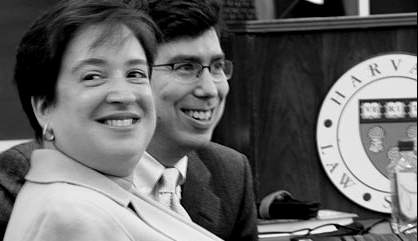
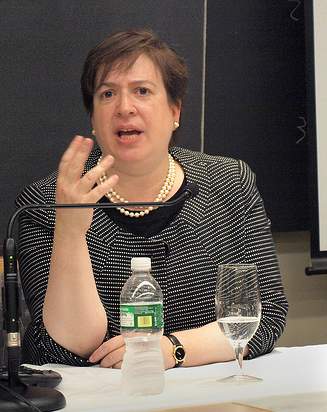
Kagan “Loves” the Federalist Society
Hosts discuss Elena Kagan’s background with Francis Boyle, Professor of law at the University of Illinois. Boyle is author of “Tackling America’s Toughest Questions.” In his article titled – – Supreme Court Pick: Kagan “Loves” the Federalist Society, – – Boyle notes Kagan explicitly endorsed the Bush administration’s bogus category of ‘enemy combatant,’ whose implementation has been a war crime in its own right. He also writes that “Kagan has actually said ‘I love the Federalist Society.’ Almost all of the Bush administration lawyers responsible for its war and torture memos are members of the Federalist Society. Read – Dean Elena Kagan: Harvard’s Gitmo Kangaroo Law School — The School for Torturers
Law Professor, Francis Boyle:
- She has fully defended the hideous Bush atrocities, civil rights, human rights, civil liberties.
- No retreat or abandonment of the Bush positions.
- She (Kagan) did write this tome in the Harvard Law Review, equivalent to the Federalist Society, unitary executive power theory of the presidency.
- She’d be a total disaster on the cases that really count for the future of the US Constitution and the Bill of Rights.
- She’s a neo-conservative and has no qualifications to speak of.
- (She) hired Jack Goldsmith, author of torture memos and helped set up kangaroo court system in Guantanamo. We are still fighting Kagan supporting the Bush war on terrorism.
- Kagan stated on National Public Radio on December 22, 2009, “I Love The Federalist Society”
- Obama and his people know that Kagan will be the spear carrier for presidential powers on the Supreme Court
- This is a very dangerous time for the future of our republic and Constitution. The statement that she cares for the common people. . . she’s an elitist snob.
- There she is promoting globalization at Harvard Law School?? Hiring people to teach “globaloney” just to lick the boots of Larry Summers? While dean at Harvard Law School, she was moonlighting at Goldman Sachs payroll.
- This is all incredibly incestuous. Unlike Bush who wasn’t a lawyer, Obama taught Constitutional Law at the University of Chicago Law School, he should know better.
Guest – Professor Francis Boyle, A scholar in the areas of international law and human rights, Professor Boyle received a J.D. degree magna cum laude and A.M. and Ph.D. degrees in political science from Harvard University. Prior to joining the faculty at the College of Law, he was a teaching fellow at Harvard and an associate at its Center for International Affairs. He also practiced tax and international tax with Bingham, Dana & Gould in Boston.
He has written and lectured extensively in the United States and abroad on the relationship between international law and politics. His eleventh book, Breaking All the Rules: Palestine, Iraq, Iran and the Case for Impeachment was recently published by Clarity Press. His Protesting Power: War, Resistance and Law has been used successfully in anti-war protest trials.
——-



In Memory of Attorney Rhonda Copelon
Hosts talk with Cathy Albisa, executive director of the National Economic and Social Rights Initiative. about the human rights legacy of Rhonda Copelon. Rhonda had a huge influence on changing international law for human rights. She founded the International Women’s Human Rights Law Clinic.
Lawyers You’ll Like series with Rhonda Copelon. Part 1 / Part 2.
Attorney Cathy Albisa:
- I worked with Rhonda at CUNY, we both co-counseled with CCR on a couple of cases.
- I met Rhonda on a car ride, a 25 hour car ride. We spent 25 hours talking about human rights in the United States. Rhonda had a huge influence on NESRI
- Rhonda never stopped lamenting Harris v McRae, she was still furious and outraged.
- The assumption embedded in that case is the court is saying, we’re not responsible as a society, the poverty of this woman. Copeland Fund For Gender Justice. Rhonda thought it was critical that a progressive gender perspective be embedded into some body of work that really looked at these gender issues in a cross cutting way, that understood the relevance of poverty, the relevance of race, the relevance of sexual minorities.
- Rhonda was not a wealthy woman, she was a law professor and saved her money. She gave 1 million dollars for this fund and that was everything. The case that she says always saved my life was Filártiga v. Peña-Irala.
- She founded the International Women’s Human Rights Law Clinic. What she did with that clinic is challenge the traditional model of human rights law coming out of the United States.
- She made no claims of being objective, she was on the side of victims, of people with similar politics to her own.
- This changed international law. Rhonda: Don’t disregard the banal, the ordinary things that actually represent deep violations.
- The way Rhonda went about things, she merged intellectual capital with a strategic ferocity and personal good will and relationship building.
- She thought it was very important that people understand they’re part of a broad social justice and human rights movement.Cathy Albisa joins us today to talk about her work with the National Economic and Social Rights Initiative and Rhonda’s work as legal adviser to the Women’s Caucus for Gender Justice.
Guest- Cathy Albisa, is a constitutional and human rights lawyer with a background on the right to health. Ms. Albisa also has significant experience working in partnership with community organizers in the use of human rights standards to strengthen advocacy in the United States. She co-founded NESRI along with Sharda Sekaran and Liz Sullivan in order to build legitimacy for human rights in general, and economic and social rights in particular, in the United States.
——————————————–
Censorship, Civil Liberties, Criminalizing Dissent, Gaza, Guantanamo, Habeas Corpus, Human Rights, Military Tribunal, Prison Industry, Targeting Muslims, Torture, Truth to Power
Podcast: Play in new window | Download
Updates:
—

Historic International Support: Gaza Freedom March Debrief
Hundreds of activists with the Gaza Freedom Marchers have returned from Israel, Palestine and Egypt bringing home incredible stories from the largest international mobilization of people in solidarity. We hear first hand accounts from our own Michael Ratner who with his family were among the 13 hundred solidarity marchers. We are also joined by Felice Gelman who has also returned from the Gaza Freedom March. As many listeners may know, the Egyptian authorities refused to allow the 1,365 participants from 43 countries to enter the Gaza Strip, but later 100 people were let in to Gaza.
Felice Gelman / Michael Ratner:
- It was a remarkable event despite not getting into Gaza. 1400 people from 43 countries, Europe India, Australia, South Africa. Within 3 days the Egyptian government went from we need more info, we’re working with you to . . . you’re not coming.
- We were unable to get a meeting place at any time for any group of people. The Egyptians said that any gathering of more than six people would be illegal. One of the prerequisites in order to get into Gaza is you don’t engage with local opposition in Egypt. In a way it was a perfect demonstration of what the siege in Gaza is all about.
- Egypt is a police state. There are 2 million police for a population of 60 million.
- Egyptian police are very brutal with their people. They’re disappeared, they’re tortured. No room for democracy. No support for a civil society to express itself to protest.
- The thing that was incredible was the number of Egyptians that wanted to join us. There were a couple of instances where people were hurt. The secret police would try to single people out at a demonstration and punch or hit them.
- They would identify women who were Muslims. I don’t know if was that they were Egyptian and they (secret police) thought they could get away with it. They beat up a 12 year old girl and a 75 year old woman, they were not discriminating.
- Egyptians (opposition) joined in with GFM demonstrations in Cairo.
- We had a demonstration at the US Embassy in Cairo, the police surrounded them for five hours before they could get into Embassy. The US Embassy didn’t seem to think that this was bizarre until they were reminded of their legal obligation to help their citizens.
- the US Embassy informed the Egyptian police that they had no objection of us going to Gaza.
- There were some people who went to Al-Arish, and the Egyptian police were onto that. They surrounded a hotel in Al-Arish
- (Michael Ratner) I can’t imagine the logistics and the organizing nightmare it was for you guys
- I can’t think of a time since the Spanish Civil War, that there was a contingent of such size and national breadth that traveled to assist people in their distress from a brutal attack.
- I think this was an incredible demonstration of where the world stands on Gaza.
- My kids 19 and 21, seeing people with the courage to go to these demonstrations from all over the world. Out of that I think there will be a global organizing structure.
- The other thing is the drafting of the Cairo Declaration, drafted by the South African delegation. Calling on the ending of the occupations of Gaza and the West Bank, primarily with global BDS movements. (Palestinian unified call)
- When Gaza was getting attacked, it was the South African trade unionists that refused to load the weapons that were being sent to Israel.
- The potential for labor to move on this is enormous and powerful.
- The Gaza Freedom March website will be handed over to the committee working on the Cairo Declaration.
- New York Report Back – Judson Memorial Church January 21 / 55 Washington Square S.
Guest: Felice Gelman, member of the Wespac Middle East Committee and a member of the Steering Committee that organized The Gaza Freedom March. She has traveled to Gaza twice since the Israeli invasion last year.
—————–
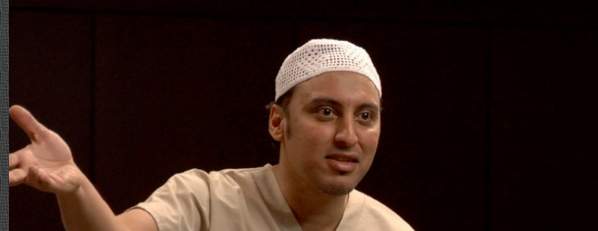
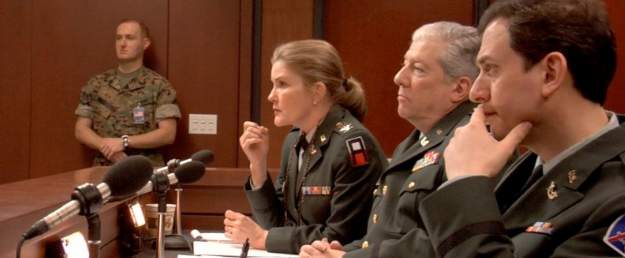
The Response: Sig Libowitz – Combatant Status Review Tribunals
January 11, 2010 marked the 8th anniversary since the Bush administration turned the US Naval Base at Guantanamo Bay, Cuba into a “enemy combatant” detention facility. Essentially re-commissioning the base as a torture chamber and legal black hole, where prisoner suicides are considered acts of war. As we’ve reported on in the last few months, the Obama administration has held on to the power to allow for a preventive detention system that would indefinitely jail terror suspects in the United States without trial. Meanwhile, military tribunals are now mainstream news, the tribunals are called Combatant Status Review Tribunals, where military justices discern who is an enemy combatant. These trials are also the subject of a 30 minute film titled The Response. The film is written and produced by actor Sig Libowitz who is transitioning from being an actor playing an attorney on the TV series Law and Order, to becoming a real lawyer. While in law school, Libowitz was tranfixed by the tribunal process of no jury and no defense lawyer. The film is based on actual court transcripts and is shortlisted for The Academy Award. The Response is screening at Columbia University’s School of Law on January 20th at 6pm.
Sig Libowitz:
- Michael Ratner: First of all there was no real process for people in Guantanamo. Then we won the right to Habeas Corpus, to go into a federal court and challenge their detention. At that point the Bush Administration set up a special process in Guantanamo.
- As we depict in the film, this is a process where the detainees don’t have a lawyer, they are not provided with the evidence that’s against them. The real transcripts told the story of the detainees and the judges in these CSRTs. From that I saw an incredible movie, and incredible opportunity.
- Because, I thought I had an understanding of what Guantanamo was all about, then I read the transcripts (of a CSRT) It gives a human dimension to the detainee and the military judges.
- Screening at Columbia Law School, Wednesday January 20th 6PM All the cast will be there and Shane Kadidal and Matthew Waxman. We’ve screened the movie at the Pentagon.
Guest: Sig Libowitz, an American lawyer, actor, film executive and director. Libowitz is notable for producing, directing and starring in a film, The Response, he wrote after reading some transcripts from Guantanamo captives‘ Combatant Status Review Tribunals. Libowitz is an executive for the acquisitions department of Turner Classic movies. He had a recurring roles in The Sopranos and Law and Order.
——————

Free Fahad Hashmi
Fahad Hashmi a Pakistani born American student, has spent nearly 2 1/2 years in solitary confinement in a Manhattan detention facility. He has been isolated for one of the longest periods in America as a suspect before trial. Hosts reported on this case in March 2008, we spoke with Fahad Hashmi’s father Syed Anwar, and Fahad’s attorney Sean Mayer. Fahad is accused of storing waterproof socks, ponchos and raincoats. The US charges were based on allowing an acquaintance “Janaid Babar” to store this rain gear in the closet of his London flat. Janaid Babar was a paid government cooperator who has been used to testify against Muslims around the world. Nicknamed ‘Supergrass’ by the British media, Babar was used by the UK government to testify against Omar Khyam and several other Muslim men in the so-called Fertilizer Case. Meanwhile Fahad’s trial is expected in January 2010, the prosecution will use Junaid as a main witness. Hashmi has been held under the SAM’s Special Administrative Measures that include a 23 hour a day lockdown, constant video surveillance of his cell and limited visitation.
(Fahad’s Brother)Faisal Hashmi:
- I’m under SAMs as our family is. Our visits with him, we can’t talk about it, but I can say from open court, he looks frail, he looks jittery He’s been in solitary confinement for 2 and half years.
- He’s in the Metropolitan Correctional Center a few blocks from here. Within his own cell, he’s videotaped at all times. He’s not allowed to talk out loud. He has a microphone in his cell.
- This is about deconstructing a human being, depriving him of his humanity. He’s 29 years old.
- Charged with four counts of material support for terrorism. He stored ponchos and rain gear.
- In 2004, this acquaintance while working on his Master’s degree stayed with Fahad.
- This was January 2004, he went to the US in April 2004, was arrested, and became a cooperating witness for the US government. At this time about 8 people got arrested, some in Pakistan, London and Canada, all on Junaid Barbar’s witness cooperation.
- In June 2006, my brother gets arrested. They tell Fahad, that Junaid gave the ponchos and gloves to Al-Qaeda and you gave material support to terrorists. You let Junaid use your cell phone, and Juanaid borrowed 300.00 from Fahad, saying that his ailing daughter needed the money. Fahad’s trial starts January 6, 2010
- FreeFahad.com This case has nothing to do with ponchos and socks.
Jeanne Theoharis:
- This is a case we need to be concerned about for those who value the first amendment. I had Fahad as a student in Brooklyn College in 2002
- There’s no way to understand this case without understanding the way Fahad was being watched many years ago even as a college student. We’ve sent a letter to the attorney general addressing 3 main issues, the conditions of his confinement, the way his due process is being violated and then first amendment issues.
- The letter was signed by more than 550 scholars and writers. Organizing among the Muslim student community.
- Theaters Against War calling attention to Fahad’s case.
- Free Fahad Vigil January 18, 2010
Guests: Fahad’s brother Faisal Hashmi and Jeanne Theoharis, an associate professor of political science at Brooklyn College, City University of New York. She was one of Fahad’s professors and she has been following this case.
———————————————————————












